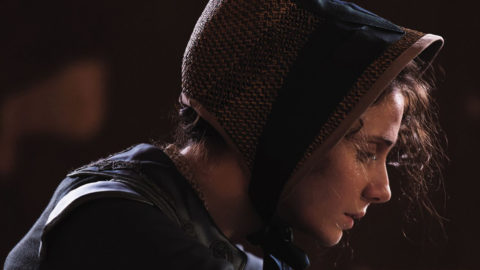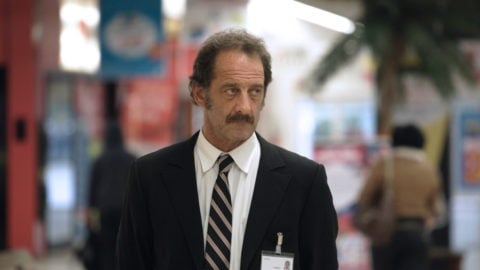Film of the Week: I, Daniel Blake
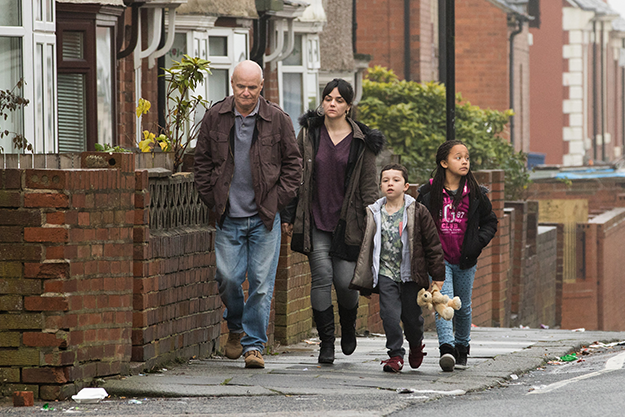
It’s giving nothing away to reveal that I, Daniel Blake ultimately involves the testament of an everyman. The film ends with a heartfelt letter from its hero: “I’m not a client, a customer or a service user… I’m not a National Insurance number or a blip on a screen. I, Daniel Blake, am a citizen—nothing more, nothing less.” Ken Loach’s latest, the winner of this year’s Palme d’Or at Cannes, is one of the most important films of 2016; there couldn’t be a more timely moment for a film about the value of citizenship, and to issue a protest against the increasingly powerful dehumanizing forces of what you might call “client culture,” the corporate logic that reduces human lives to economic statistics or blips on screens.
I, Daniel Blake is a simple film, as Loach’s best often are, and it’s a drama very precisely about the present moment in the U.K.; but its resonances are much broader, and it will strike a chord in any culture where people are experiencing economic hard times. Dan Blake (Dave Johns) is a late middle-aged carpenter from Newcastle, currently off work on his doctor’s recommendation, following a heart attack. He has been claiming benefits, but at the start of the film, he has a phone conversation with an official who mechanically runs him through a set of routine and apparently irrelevant questions. As a result, he has his benefits cut. He attempts to appeal, but ends up negotiating a maze of automated phone calls—long waits set to endlessly looped Vivaldi—and joyless conversations with hostile officials in his local unemployment office (it’s called JobCentrePlus: “Plus what?” you might well ask).
Dan has fallen into a trap. He wants to work, but can’t for now. Yet instead of getting the required rest, he’s obliged to traipse around town applying for jobs he is in no position to accept; otherwise he will lose his Job Seeker’s Allowance, the only benefit he is currently entitled to. To keep receiving it, he must bend to the logic of the system, which demands that he sell himself energetically on the job market. He is sent to attend a résumé workshop, where the bullish instructor tells the class, “You must stand out from the crowd.” In the end, Dan does indeed find a way of standing out from the crowd—but this isn’t what the instructor means. In reality, he means the exact opposite. He means: blend in, be compliant, above all use the required language—the language of “clientship,” not citizenship.
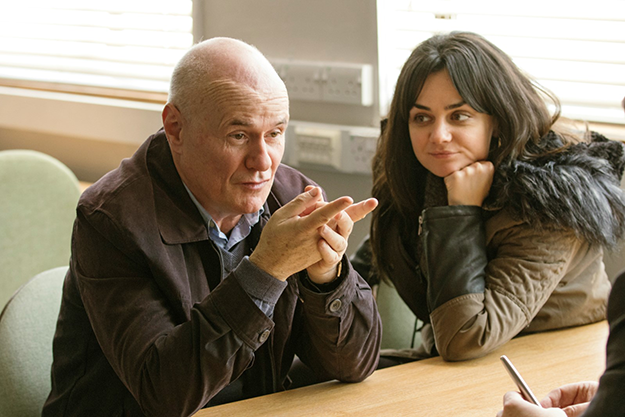
I, Daniel Blake deserves its Cannes win; it’s one of the most moving films of the year, and a politically urgent one. It’s also one of the director’s recent best. I speak as one who has sometimes grudgingly admired Loach’s films; who has sometimes felt bored by them or awkwardly preached at; and who has often been very much affected while wishing there just was a bit more cinema to them. Loach’s best since the early ’90s (including Ladybird, Ladybird, My Name is Joe and Sweet Sixteen) have shone above all because of his brilliant direction of actors, while in the recent film of his that feels most energetically cinematic, historical drama The Wind That Shakes The Barley, it’s the uncharacteristic aspiration to an epic register that overcomes a tendency to schematic narrative.
A key problem with late Loach—especially in his collaborations with screenwriter Paul Laverty—is the desire to gratify with triumphant outcomes. Loach and Laverty often find it hard to resist endings in which working-class characters teaming together in joyous solidarity prevail, sometimes comically, over the exploitative forces of conservatism and feral capitalism. In Looking for Eric, the hero and a coachload of his football-loving mates take up arms against a bunch of thugs (you know what they say: if it’s blokes on a coach, you’re watching Ken Loach).
But I, Daniel Blake doesn’t try and gratify with either easy triumph or facile tragedy. Loach and Laverty offer a considerably more complex drama than that, and one that doesn’t have obvious villains; its villain, rather, is the system. True, there are some unlikeable characters, notably some egregiously unempathetic JobCentre officials. But the film suggests that it’s in the nature of the system—and notably, its language—that bends people to its structures of thinking. I, Daniel Blake is, in this sense, a film about everyday inhumanity—or if you wanted to call it that, everyday bureaucratic fascism.
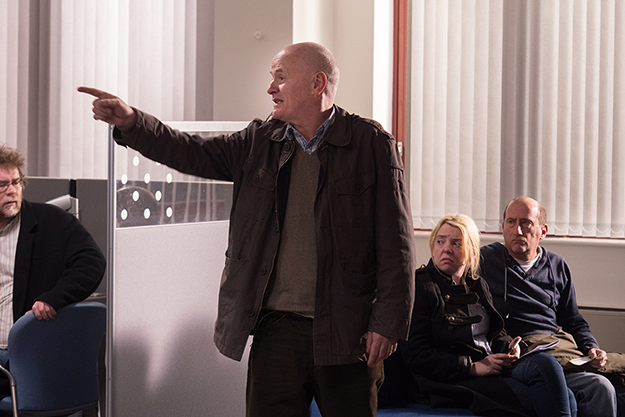
Dan is no saint, just an ordinary working stiff, who’s momentarily unable to work: another “Joe,” as in My Name Is Joe, plain “Daniel Bloke.” He’s sometimes affable, sometimes cantankerous and impatient: one seemingly throwaway scene has him exchanging insults with a man whose dog craps on his estate’s lawn, but it also shows him as public-spirited and railing against those who aren’t. In the Job Centre, he defends a young woman, Katie (Hayley Squires), a single mother of two who has just moved up from London; she is given a rough deal by the center’s time-keeping, box-ticking jobsworths.* Dan befriends the family, helps them get their run-down flat inhabitable (some useful tips here about storing heat with bubble wrap, tea lights, and flowerpots). He becomes a father figure to Katie, and an adoptive uncle to the kids, not because he’s an exemplary Samaritan, just a decent man and a good neighbor (and besides, he has spare time on his hands).
There are other good neighbors in the film: like the people who, in the film’s most poignant scene, show friendliness and concern for starving Katie in the local food bank (food banks having become an alarmingly familiar element of modern British life). There’s also a shop manager who, when Katie is brought to his office having attempted to shoplift, discreetly lets her go without humiliating her. Conversely, the security man who apprehends her in the first place afterwards recruits this visibly needy woman for work as a prostitute. It’s suggested, in fact, that in hard-as-nails Austerity Britain, everyone is in danger of becoming a prostitute of one kind or another.
However, those who work for the system, notably for the benefits office, are not demonized by the film. They are often deeply unsympathetic, but the problem is that they speak a certain sort of language. The Job Centre manager tells him that Dan that he is obliged to do everything online, whether he likes it or not: “We’re digital by default.” Old-fashioned Dan replies, “I’m pencil by default.”
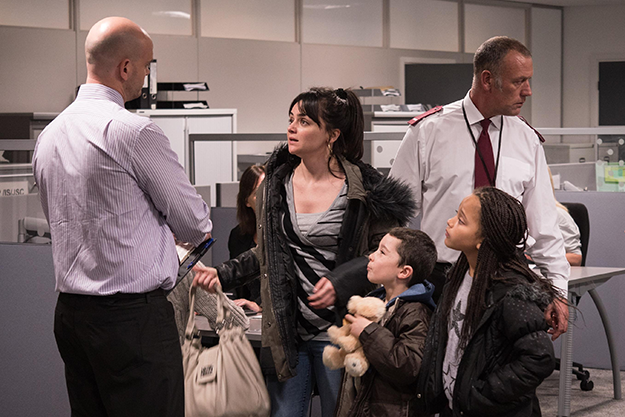
The most unpleasant character is an official (Sharon Percy) who never departs from the mode of automaton-speak: “I’m afraid I’m going to have to refer you to the decision maker for a possible sanction. Do—you—understand?” It’s the dehumanized language of a system which has its set script, its set menus, and tolerates no deviation: human interaction becomes instead formalized interface.
One of the reasons, in fact, that I, Daniel Blake is so eloquent is because it’s so much a film about language—about how imposed official codes dehumanize as they process people, fitting them into fixed, sanctioned slots. It’s notable that the Job Centre security guard—ushering Katie off the premises for protesting, and Dan for supporting her—says, “I need you to keep going for me.” It’s a false-sounding formulation that you can’t imagine anyone from Newcastle ever saying naturally, if they weren’t channeling the borrowed language of U.S. cop movies.
The most horrifying piece of managerial language we hear is the invocation of the mysterious “decision maker” from whom Dan is told to expect a letter. The letter never comes, and an official on the phone seems to hold Dan himself responsible for this failing of the system: “He should have called you first”—“Well, he didn’t,” says Dan—“Well, he should have done.” There’s no escape from this closed circuit. “Decision maker” sounds like an invented Kafkaesque term, but it turns out that it’s standard. Indeed, rather than being monstrous Oz-like figures, “decision makers” too are hapless cogs in the system: as witness this, about decision makers reportedly in tears as a result of the pressure on them to dissuade claimants from appealing their cases.
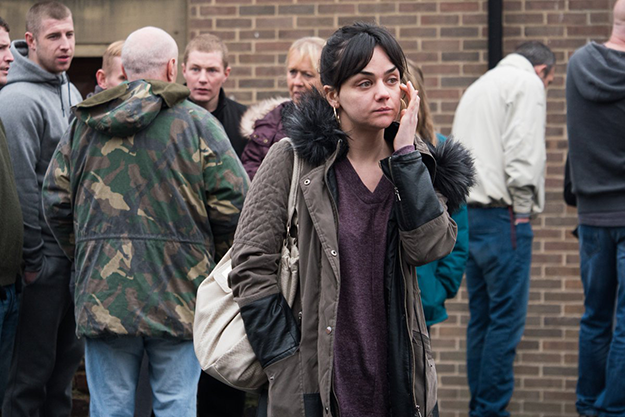
The nature of this pressure is shown in a scene where a sympathetic Job Centre official (Kate Rutter) is cautioned by her boss for taking the time to help Dan; she’s holding up the assembly line (her action is “not acceptable… You set a precedent”).
The dehumanizing effect of language, of imposed codes of behavior, is a key theme in some other recent political films. Loach’s film very much is of a piece with Stéphane Brizé’s The Measure of a Man; its French title, La Loi du marché means “The Law of the Market,” but the English title captures the way that the market forces governing “human resources” (another hideous cant term) function by quantifying humans, fitting them into predefined market categories. Brizé’s unemployed hero (Vincent Lindon) is, like Dan, obliged to learn the codes for selling himself as employable—promoting himself as a viable human product—in other words, to speak the approved language of the recruitment sector. In a different register is another outstanding film of 2016 that addresses similar themes: Maren Ade’s Toni Erdmann, in which a ’60s-generation leftie father launches a sort of performance-style guerrilla intervention to de-brainwash his daughter, who has whole-heartedly embraced the values and codes of corporate capitalism. Toni Erdmann is about reawakening empathy, with language as the battleground between emotion and cold protocol.
I, Daniel Blake is about a lot more than language, of course, and it would ill serve the film to reduce it to questions of abstraction. The film is a dramatic exposé of the way that the austerity measures of Britain’s Conservative government have had a disastrous, radically disempowering effect on the country’s unemployed and underprivileged. Superficially, I, Daniel Blake may seem to be about the very recent past: a bystander’s jeer at the Old Etonians in government pinpoints the drama as belonging to the era of the David Cameron administration, which exploded in its own face as a result of the Brexit referendum it ill-advisedly held (ill-advisedly for itself, and for the nation). The current Conservative government, under Theresa May, has made noises about compassion for “just-about-managing families,” but the rhetoric rings hollow; on the day I’m writing this, reports have appeared about the government’s decision to close the civil service’s child poverty unit.
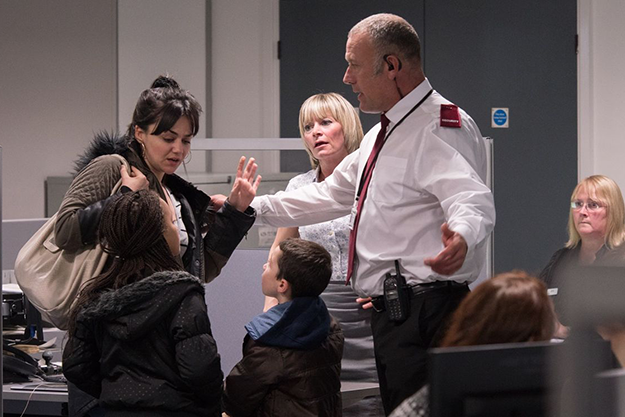
In the U.K., I, Daniel Blake has struck a chord; it has grossed over $3,800,000 here, making it Loach’s second biggest domestic success, following The Wind That Shook the Barley. It has also stirred up genuine controversy, something rare these days for a British independent film. Sunday Times critic Camilla Long dismissively called it “condescending” and “patronizing” to benefits claimants: “misery porn for smug Londoners,” “a povvo safari for middle-class viewers.” In right-wing weekly The Spectator, Toby Young wrote a super-sneery review of this “relentlessly depressing” film (it’s not: Blake’s defiant humanity is hugely inspiring). Young also claims that Loach’s invocation of working-class solidarity and compassion is misplaced: “it may break Loach’s heart to learn that working class voters in the North of England are just as keen on cutting welfare as Conservatives in the South.”
Despite the undeniable turn to the right in Brexit-era Britain, these are pretty miserable grounds on to dismiss this emotionally and politically urgent movie. There are seemingly gauche flaws in the film: in 2016, it’s hard to believe in a late-middle-aged city dweller being quite so computer-illiterate and referring to “that Internet web thing.” And there’s a problem with the casting of Katie’s young daughter: Briana Shann sounds just a bit too genteel, and besides, the character is made, in Dan’s hour of despair, to carry the emotional can in a manner that’s too melodramatically obvious. But this is also Loach’s most achieved film as film for some time. Without over-emphasis, Robbie Ryan’s cinematography catches the beige drabness of the bureaucratic world, and in Jonathan Morris’s subtle editing, the acutely painful food bank scene discreetly fades to black without the point being pushed. Dave Johns, by profession a stand-up comic, is superb as Dan, by turns vulnerable, gruff, and (well, why the hell not?) a touch sentimental; and Hayley Squires, without too obviously incarnating Cockney resilience, mixes toughness with a clear, hard evocation of Katie’s desperation.
Toby Young may claim that the film doesn’t ring true as a depiction of the life of a benefits claimant; but as a metropolitan journalist well insulated from the struggles Dan faces, how the hell would he know? As one myself, I can’t claim to know any better, so I can only take it on trust that Loach and Laverty have done their research assiduously. For me, I, Daniel Blake certainly rings true as drama, enough to profoundly move this avowed Loach skeptic on two viewings (one in Cannes, one a revisit this week). In a year in which a resurgence of populism has had disastrous consequences on both sides of the Atlantic, one hesitates to invoke the P-word, but the direct, deeply affecting humanity of Loach’s film suggests that I, Daniel Blake could just as well, and just as nobly, be titled We, the People.
* British slang term meaning an obstructive petty official, often a security officer or clerk who’s more concerned to cover their own arse than with common decency: as in, “Sorry mate, it’s more than my job’s worth.”
Jonathan Romney is a contributing editor to Film Comment and writes its Film of the Week column. He is a member of the London Film Critics Circle.




